- Home
- Martin Amis
House of Meetings Page 4
House of Meetings Read online
Page 4
Even within the stratum of the shiteaters, Venus, there were two echelons. There were some shiteaters that the other shiteaters looked down on. These were known as all-fours shiteaters…I relay these details, my dear, these details of awlings and chiselings, of educated, even cultivated men eating slops on their hands and knees, because I want you to think about their strangeness. Wildly directed violence, drastic degradation: this is all terribly strange.
“Why’s it so fucking dark around here,” he said.
It was a complaint, not a question. Lev, the swot geographer, knew why it was so dark around here.
“Yes yes,” he said. “This is the Arctic in February. The sun’ll come up in March. What do I do, brother? What do I do?”
I was ready for this. The majority of the fascists who got ten-year sentences in 1937–38 had been rearrested, in alphabetical order, and resentenced in 1947–48. And they all looked like Lev. Older, thinner, wilder—but they all looked like Lev, the rapidly blinking intelligent, with his hopeless shoes (vastly dissimilar, but each a dog’s dinner of frayed rope and car tire), his half a book, and his torn summer jacket. And always cherishing the fractured spectacles. Whereas the new fascists were men who had spent five years in the Red Army. For us the camp was just more war, with one startling difference. We had fought the fascists—the enemy. Then the Russian state, now fascist itself, told us that we were the fascists, and they were arresting us for it and enslaving us for it. Now we were the enemy, to be flung out over the shoulder of the world. I have noticed that you and your crowd have a high tolerance for self-pity in others, so I will add the following. What made this capsizal hard to forget was that my war wound throbbed in the cold from September to June. But I mustn’t be self-pitying. I mustn’t be the lachrymist. There are other things I mustn’t be—the tough guy, the martyr. And I mustn’t be indignant. Or earnest. That’s less difficult. Americans are earnest, Russians, when the mood is on them, are earnest. While I prefer the droller cultures, and the wizened ironists, to be found on the northwestern fringe of the Eurasian plain.
What do you do? I began. Oh we’ll come to that. But first—aren’t you going to say it?
“Say what?”
You know: “There must have been a mistake.” Or “If only someone would tell Joseph Vissarionovich.”
“…Why the fuck would I say that? They arrest by quota. They do. I bet they do.”
Lev was right about that. The Terror, too, was driven by quota: this or that many people from this or that area and social group, at such and such a rate, quotas, norms, minimums.
“You know what’s happened,” he said. “You and I have been sold into slavery. All that fucking around with the interrogations and the confessions and the documents. That’s just the process of being sold into slavery. It sounds quite romantic, doesn’t it, being sold into slavery…”
He looked around. No, there was nothing romantic about Norlag, about Predposylov.
“I mean, you’d expect somewhere hot. Jesus.”
Lev was nineteen. And already he was seeing more than I saw (I had no head for politics, as will soon be evident). Looking back, now, I can recall my fever of fear when I realized that the younger brother saw more than the older. It happened over the chess board. I felt myself exposed to greater powers of combination, of permutation and penetration. And he always stood back from the general opinion, the general mood. Except when it happened to suit him, he never went along with anything. He always made his own calculation. He pushed out a rigid nether lip, slightly off center, lowered his gaze, and made the calculation.
And I asked him: Which prison?
“Butyrki.”
Butyrki’s great, isn’t it.
“Great. In my cell I had three Red professors, two composers, and one poet. Oh yeah—and one informer. I was proud to be there. Butyrki’s great.”
Great. How did it go? Before.
“The usual thing. Called out of class at the Tech. Quite polite. Then for a couple of weeks I had to go to the Kennel every other day and eat shit.”
A shiteater veered up at us from the darkness, and then stepped back with his blanketed forearm raised. I said,
What was the charge? Or didn’t they give you one.
“They gave me one.” He let out a soft snort and said, “Praising America.”
I knew this to be a crime, sure enough, and one with several subsections. Many recently arrived fascists had committed it—Praising American Democracy or Praising American Technique or Abasement Before America. Or alternatively Abasement Before the West. Not a few of our number had now seen something of the West; and even in ruins it abased us…There were scores of Americans in Norlag, including an American American. Come over here to participate in the Soviet experiment, he told the CP man who issued his passport that he was fully prepared to take the big cut in his standard of living. That same day he got the quarter—twenty-five years.
And were you praising America?
“No. I was praising The Americas. I was in a queue with Kitty and I was praising The Americas.”
Then we both did something we hadn’t been expecting to do for some time to come: we laughed—with our vapor forming and fleeing. I understood. “The Americas” was sibling code for Zoya. And it was a good name for her too, because it caught her walk. The spatial relationship between the two continents, Venus, has best been evoked by the exile Nabokov: two figures on a trapeze, in the big top, one beneath the other, and just coming out of the backswing. But Zoya’s walk also expressed it, embodied it, the giddy disjunction between north and south, and then the waist, as thin as Panama. Kitty was family, Lev’s full sibling, like Vadim, the other one.
And was Kitty dispraising The Americas?
“You know. A bit. Basically Zoya makes Kitty feel like a pencil. No. Like Chile. That’s what I told her. You’re jealous of The Americas because she makes you feel like Chile.”
I said, I thought Kitty was keen on Zoya.
“Kitty is riveted by Zoya. But she says she’ll destroy me. Not on purpose. But that’s what will happen in the end.”
I would remember this. Right from the start I had fingered Zoya for a decimator of the poets, and a poet (Acmeist, Mandelstamian) was what Lev, at this stage, was in some sense hoping to be…There came a clatter from within and the sound of voices. The shiteaters looked up, with thin mouths and smiling eyes.
“Chile,” Lev said suddenly. “You’d have to be an island to be less landlocked than Chile.”
He sniffed, wiped his nose, and straightened his shoulders. His upper lip, temporarily beaklike, and his wary glance: he looked like what he was—an adolescent, fearing ridicule after a vulnerable remark…Lev had always been owlishly capable of getting excited by geography. I remember he once said, “The Pacific is the prince of the oceans. The Atlantic’s a mere strait when compared to it.” And he had a whole theory about the geography of Russia, how it determined both her history and her fate. Oh, Venus, what good boys we were, originally. I think I told you that our mother was a schoolteacher. She was in fact a completely different kind of human being: she was a headmistress. And therefore a harpy of ambition. “You are intelligents!” she used to shriek at us, often out of a clear blue sky. “You serve the nation, not the state!” And there we were, Lev and me, with our books and our thick periodicals, our basic German, English, French, our heavy chess pieces, our maps and charts.
I said, as I’d planned, You have arrived in hell. I don’t have to tell you that. Here, man is wolf to man. But the funny thing is it’s just like anywhere else.
“No it isn’t. It isn’t like anywhere else.”
Yes it is. You came up under Vad, am I right?
Vad, Vadim, was Lev’s twin brother (fraternal—profoundly nonidentical), a leering, sidling, scheming kid, and “very socialist,” as our mother used to say as she fanned herself and blew the fringe off her brow. Tormenting Lev was Vad’s chief hobby and project for fifteen years. I’d tell Lev, Hit back, hit back. And
keep hitting back. And Lev did hit back. But always just that single flail, and then he’d curl himself up again to take his punishment. Vad, in 1948, was a military politico, junior but hyperactive, and stationed in East Germany. Incidentally, he resembled me more closely than he resembled his twin. Tacit family lore had it that Vadim, implacable even in the womb, had shouldered Lev to the side and then drained off everything good.
I said, Until the day came when you hit back and kept on hitting. What changed?
In ones and twos the shiteaters had started drifting off, back into the sector. Of those remaining, some seemed discouraged by the defection, and the aggregate loss of hope; others freshly twinkled—dreaming of the lion’s share, with Irish eyes…
Lev said, “I was different inside.”…Shit, I said. It’s just struck me. What happened to your stutter? Where’d your stutter go?
He gave a taut nod and said, “She did that. After the first night, I woke up and it wasn’t there. Can you imagine? You know what it means? It means I can’t die. Not yet.”
No, you can’t die. Not yet.
Venus, you’re probably marveling—I know I am—at my calm and helpfulness, and the superb urbanity of my fraternal exchange with the husband of the woman I loved, the husband of Zoya, healer of stutterers. The truth is that I was in shock. And not “still in shock” either: I had hardly started. I would go on being in shock for over a month, buoyed by buxom chemicals. They did me good, morally. I got a lot worse when they wore off.
I said, Here, everyone’s Vad. Vad with a wrench and a screwdriver. And you haven’t got fifteen years to adapt to it. You haven’t got fifteen hours. You’ve got till tomorrow morning.
My breath hung in the air. Even in June your breath hung in the air as if you were smoking an enormous and fiery cigar. They went out six feet and curled back around you, these scarves of breath.
The last kitchen light went out, the last internal door slammed shut, and the last lingering shiteater wandered off crying childishly into his fists.
I said, This is what you’ve got to do.
“Tell me.”
I told him. And then I said, You’re what she’s giving up her twenties for. Christ. Think of that. And when it’s this cold, don’t eat the snow. You’ll have blood on your lips and your tongue. The snow burns.
I will now briefly describe the conclusion of my thing with Zoya. I will now briefly describe my abasement before The Americas.
On March 20, 1946, it came to pass that I was alone with her, in the conical attic, at half past one in the morning.
She hadn’t actually asked me up. I’d simply attached myself to a group that was on its way to pay her a call. We were not good Communists, not anymore; but we were excellent communitarians. Community: the cardinal Russian strength, even though the state now feared it and hated it. Russians looked out for each other. Russians did do that…We sat around in our overcoats. There was no heat and no light. There was no food and no drink. We had, I remember, a paper bagful of a nameless orange tea, but no water. The tea turned out to be carrot peel. So we ate it. They were all younger than me; it was perhaps to be expected that I said very little. I didn’t care how obvious it was, how dourly obvious—my determination to be the last to leave.
Because I now felt that I had a deadline. Zoya, that day, had done something, said something, that could not but lead to her arrest, or so I judged. It will sound unserious to you, Venus; but it wasn’t unserious. The whole Tech was talking about it. After classes Zoya showed up for the plenary session of the Komsomol, or the Communist Youth League. I remember the convocations of the Komsomol: try to imagine something halfway between a temperance meeting and a Nuremberg Rally. On her way out, Zoya said, quite audibly, that the two-hour keynote address (its full title, I remember, was “The Scum of the Anarcho-Syndicalist Deviation and the City Administration Committee Decision About the Party Meeting at the Mining Institute”) had “bored her tits off.” And no no no no no, you just couldn’t say that. Doubly provocative, and she was trebly endangered—boredom and breasts and Jewishness. That night, every time I heard a car or a truck in the street, I thought, It’s them. They’re here.
A couple of days earlier, as I walked Zoya to Tech, a man going past on a bicycle shouted out something with the word kike in it. I asked her—Kike what?
“Dirty kike bedstraw,” she repeated without any emphasis.
We walked on. I said, How often does it happen?
“You know what I’d like? I’d like to be vulgar in America. I’d like to be a Jew in America—all flash. How often? You might get nothing for a week. Then you get about nine in one day.”
I’m sorry.
“It’s not your fault.”
Something strange was happening in the Soviet Union, after the war against fascism: fascism. By which I mean an abnormal emphasis on the folk (the Great Russians), together with an abnormal xenophobia. Pogrom was coming. So there were sensible, indeed cynical reasons for Zoya to look kindly on me. It was one thing to stage conspicuous entanglements with your fellow bohemians, and especially your fellow Jews; it was another thing to be the devoted companion of a tall and handsome war hero, with his medals and his yellow badge, denoting a serious wound. Not much fun to say, all that. But I’m telling you, my dear: this is the meaning, this is the daily and hourly import of state systems.
I sat with my back to the window and the moonbeams. The walls breathed or bristled in the dark. I reached out—a costume (velvet), ostrich feathers, a tasseled tambourine. With the light behind me I could stare at Zoya, seeing her singly, entire, with unprecedented indifference to detail. And I was in any case full of emotion. Untypically, for a Russian, I had been raised by my mother to regard anti-Semitism as a reflex of the gutter; and the shame I felt for my nation was so intense that it had already ruined my memory of the war. At the same time I was lost in admiration for her—for the way she hadn’t flinched in the street and her resilience, now, when everyone else was mentally packing her pillowslip. You have a consciousness of this laid down in you, Venus, and I don’t: how it feels to be the other. And we know, from the memoirists, about the pain, the physical pain, of wearing the star, also yellow, the burning crysanthemum of the star. You in your flesh have worn the star…Half of Soviet Jewry had been killed by the Germans. And now the Russians had begun to glare at the half that remained. It was coming from above but also coming from below, coming up from the depths.
At the door Zoya was saying goodnight to her penultimate guest (her farewells punctuated by a violent yawn). All the time I kept asking myself how it happened—how had I stood by and given someone such power to hurt me? In my mouth, not the usual slow drool but a humble aridity—the aching throat of the lovelorn. I would act, though, I would act; and Russia would help me. You see, when the depths stir like this, when a country sets a course for darkness, it comes to you not as horror but as unreality. Reality weighs nothing, and everything is allowed. I rose. I rose, and impended.
She placed a palm on my chest, to establish a distance, but she accepted the kiss, or withstood it; and yet, as she withdrew her mouth, she retained my lower lip for a second between her teeth, and her eyes moved sideways, ruminatively; she was chewing it over—but not at length. I said three words and she said three words. Hers were, “You frighten me…” A novelettish incitement, you may think. And I would once have taken it as that. But I deeply knew that she hadn’t liked the taste of my lips.
“I’m sorry.”
For several seconds I stood there with my hands writhing around in one another’s grasp. And then I, the decorated rapist, I, who went through a woman a week using every form of flattery, false promises, bribery, and blackmail, not to mention the frank application of masculine bulk—I gave out a noise like the muffled coo of a pigeon, kissed her palm, and staggered out, seeming to twirl end over end all the way down the stairs.
They didn’t come for her, of course. They came for me. And understand that it didn’t feel like the worst thing that h
ad ever happened when, ten weeks later, they gave me ten years.
This was his first morning and he was out there in the sector.
This was what I told him, as we stood among the shiteaters and their eager swirls of breath, their laughing eyes. I told him he would join their number unless he could find some murder in his heart. I told him that the acceptance of murder was the thing that was being asked of him.
This was Lev in the yard. His face, already brick-red, wore a gashed forehead and a split lip. During the bungled headcount (and recount, and re-recount), many of the men in his brigade—a strong brigade—were running on the spot, or at least flapping their arms about. Lev was doing jumping jacks.
PART II
1.
Dudinka, September 2, 2004
The phrase “dirty old man” has two meanings, and one of them happens to be literal. There is a dirty old man on board who is that kind of dirty old man. He may be a dirty old man of the other kind too, but something tells me that the two callings are difficult to combine. Now tell me, Venus. Why do I feel tempted to take the road of this dirty old man? I hate washing more and more every day, and shaving, and I hate stuffing my laundry into plastic bags and writing “socks—4 prs.” I almost burst into tears, the other morning, when I realized I’d have to cut my toenails one more time. A really dirty old man wouldn’t bother. What clarity and intrepidity, what boldness and pride. I find I deeply admire this dirty old man. His leftover-infested beard, his death-ray breath, and his rotting, many-layered overcoat are things that everyone else has to worry about. The smell that follows him about, and precedes him, is light-speed: you know it the instant he enters the dining room even when he’s forty feet away. He behaves as though it isn’t his fault and he’s innocent. He’s clean: in some mysterious way, he’s clean. Yesterday he disembarked; I saw him, quite a distance off, being canoed through the mist—a mist perhaps of his own making—to what looked like a fish cannery lurking under the eaves of the western bank.

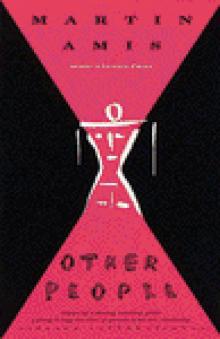 Other People
Other People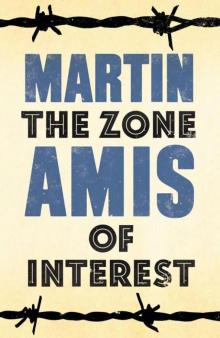 The Zone of Interest
The Zone of Interest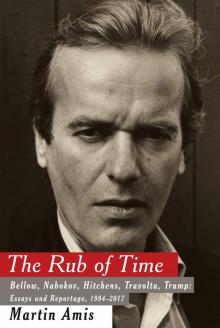 The Rub of Time: Bellow, Nabokov, Hitchens, Travolta, Trump
The Rub of Time: Bellow, Nabokov, Hitchens, Travolta, Trump Koba the Dread
Koba the Dread Success
Success London Fields
London Fields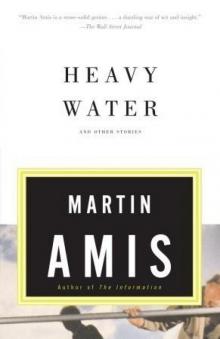 Heavy Water: And Other Stories
Heavy Water: And Other Stories Money
Money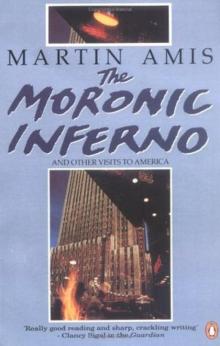 The Moronic Inferno and Other Visits to America
The Moronic Inferno and Other Visits to America Yellow Dog
Yellow Dog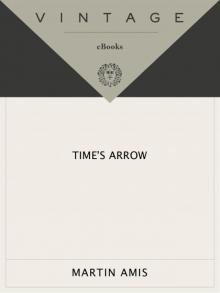 Time's Arrow
Time's Arrow Experience: A Memoir
Experience: A Memoir Einstein's Monsters
Einstein's Monsters The Pregnant Widow
The Pregnant Widow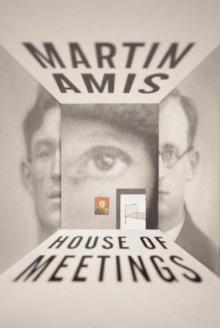 House of Meetings
House of Meetings The Information
The Information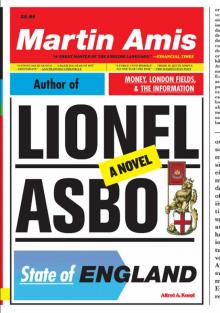 Lionel Asbo: State of England
Lionel Asbo: State of England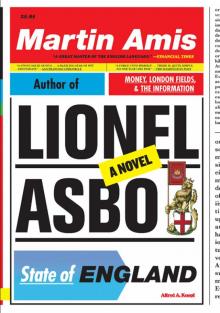 Lionel Asbo
Lionel Asbo Heavy Water and Other Stories
Heavy Water and Other Stories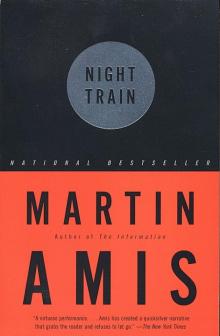 Night Train
Night Train Heavy Water
Heavy Water The War Against Cliche: Essays and Reviews 1971-2000 (Vintage International)
The War Against Cliche: Essays and Reviews 1971-2000 (Vintage International)